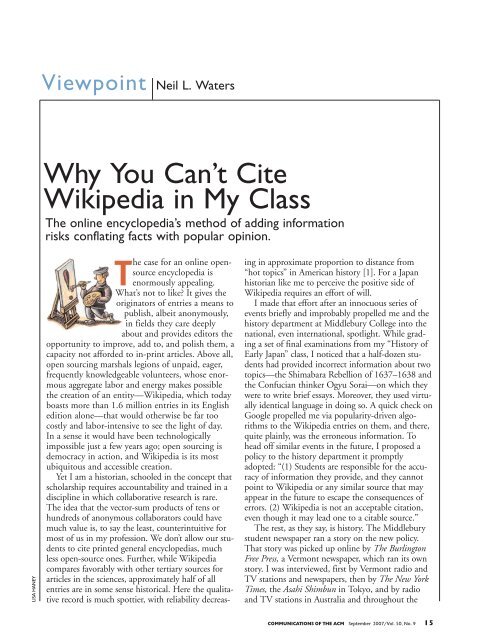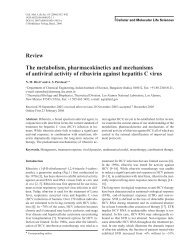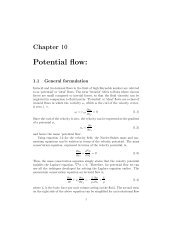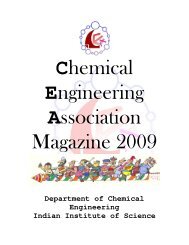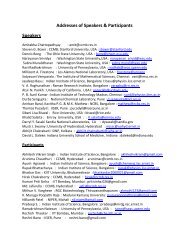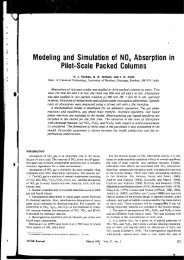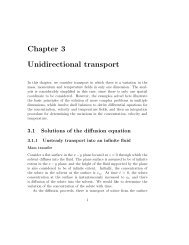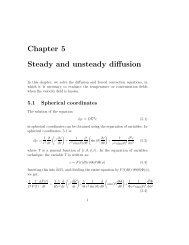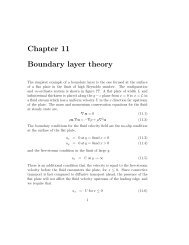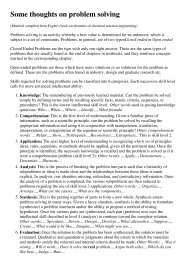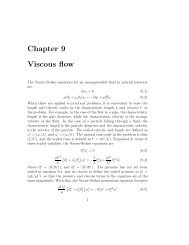Why you can't cite Wikipedia in my class - University of Hawaii
Why you can't cite Wikipedia in my class - University of Hawaii
Why you can't cite Wikipedia in my class - University of Hawaii
Create successful ePaper yourself
Turn your PDF publications into a flip-book with our unique Google optimized e-Paper software.
Viewpo<strong>in</strong>t Neil L. Waters<br />
<strong>Why</strong> You Can’t Cite<br />
<strong>Wikipedia</strong> <strong>in</strong> My Class<br />
The onl<strong>in</strong>e encyclopedia’s method <strong>of</strong> add<strong>in</strong>g <strong>in</strong>formation<br />
risks conflat<strong>in</strong>g facts with popular op<strong>in</strong>ion.<br />
LISA HANEY<br />
The case for an onl<strong>in</strong>e opensource<br />
encyclopedia is<br />
enormously appeal<strong>in</strong>g.<br />
What’s not to like It gives the<br />
orig<strong>in</strong>ators <strong>of</strong> entries a means to<br />
publish, albeit anonymously,<br />
<strong>in</strong> fields they care deeply<br />
about and provides editors the<br />
opportunity to improve, add to, and polish them, a<br />
capacity not afforded to <strong>in</strong>-pr<strong>in</strong>t articles. Above all,<br />
open sourc<strong>in</strong>g marshals legions <strong>of</strong> unpaid, eager,<br />
frequently knowledgeable volunteers, whose enormous<br />
aggregate labor and energy makes possible<br />
the creation <strong>of</strong> an entity—<strong>Wikipedia</strong>, which today<br />
boasts more than 1.6 million entries <strong>in</strong> its English<br />
edition alone—that would otherwise be far too<br />
costly and labor-<strong>in</strong>tensive to see the light <strong>of</strong> day.<br />
In a sense it would have been technologically<br />
impossible just a few years ago; open sourc<strong>in</strong>g is<br />
democracy <strong>in</strong> action, and <strong>Wikipedia</strong> is its most<br />
ubiquitous and accessible creation.<br />
Yet I am a historian, schooled <strong>in</strong> the concept that<br />
scholarship requires accountability and tra<strong>in</strong>ed <strong>in</strong> a<br />
discipl<strong>in</strong>e <strong>in</strong> which collaborative research is rare.<br />
The idea that the vector-sum products <strong>of</strong> tens or<br />
hundreds <strong>of</strong> anonymous collaborators could have<br />
much value is, to say the least, counter<strong>in</strong>tuitive for<br />
most <strong>of</strong> us <strong>in</strong> <strong>my</strong> pr<strong>of</strong>ession. We don’t allow our students<br />
to <strong>cite</strong> pr<strong>in</strong>ted general encyclopedias, much<br />
less open-source ones. Further, while <strong>Wikipedia</strong><br />
compares favorably with other tertiary sources for<br />
articles <strong>in</strong> the sciences, approximately half <strong>of</strong> all<br />
entries are <strong>in</strong> some sense historical. Here the qualitative<br />
record is much spottier, with reliability decreas<strong>in</strong>g<br />
<strong>in</strong> approximate proportion to distance from<br />
“hot topics” <strong>in</strong> American history [1]. For a Japan<br />
historian like me to perceive the positive side <strong>of</strong><br />
<strong>Wikipedia</strong> requires an effort <strong>of</strong> will.<br />
I made that effort after an <strong>in</strong>nocuous series <strong>of</strong><br />
events briefly and improbably propelled me and the<br />
history department at Middlebury College <strong>in</strong>to the<br />
national, even <strong>in</strong>ternational, spotlight. While grad<strong>in</strong>g<br />
a set <strong>of</strong> f<strong>in</strong>al exam<strong>in</strong>ations from <strong>my</strong> “History <strong>of</strong><br />
Early Japan” <strong>class</strong>, I noticed that a half-dozen students<br />
had provided <strong>in</strong>correct <strong>in</strong>formation about two<br />
topics—the Shimabara Rebellion <strong>of</strong> 1637–1638 and<br />
the Confucian th<strong>in</strong>ker Ogyu Sorai—on which they<br />
were to write brief essays. Moreover, they used virtually<br />
identical language <strong>in</strong> do<strong>in</strong>g so. A quick check on<br />
Google propelled me via popularity-driven algorithms<br />
to the <strong>Wikipedia</strong> entries on them, and there,<br />
quite pla<strong>in</strong>ly, was the erroneous <strong>in</strong>formation. To<br />
head <strong>of</strong>f similar events <strong>in</strong> the future, I proposed a<br />
policy to the history department it promptly<br />
adopted: “(1) Students are responsible for the accuracy<br />
<strong>of</strong> <strong>in</strong>formation they provide, and they cannot<br />
po<strong>in</strong>t to <strong>Wikipedia</strong> or any similar source that may<br />
appear <strong>in</strong> the future to escape the consequences <strong>of</strong><br />
errors. (2) <strong>Wikipedia</strong> is not an acceptable citation,<br />
even though it may lead one to a citable source.”<br />
The rest, as they say, is history. The Middlebury<br />
student newspaper ran a story on the new policy.<br />
That story was picked up onl<strong>in</strong>e by The Burl<strong>in</strong>gton<br />
Free Press, a Vermont newspaper, which ran its own<br />
story. I was <strong>in</strong>terviewed, first by Vermont radio and<br />
TV stations and newspapers, then by The New York<br />
Times, the Asahi Shimbun <strong>in</strong> Tokyo, and by radio<br />
and TV stations <strong>in</strong> Australia and throughout the<br />
COMMUNICATIONS OF THE ACM September 2007/Vol. 50, No. 9 15
Viewpo<strong>in</strong>t<br />
U.S., culm<strong>in</strong>at<strong>in</strong>g <strong>in</strong> a story on NBC Nightly News.<br />
Hundreds <strong>of</strong> other newspapers ran stories without<br />
<strong>in</strong>terviews, based primarily on the Times article. I<br />
received dozens <strong>of</strong> phone calls, rang<strong>in</strong>g from laudatory<br />
to actionably defamatory. A representative <strong>of</strong><br />
the Wikimedia Foundation (www.wikipedia.org), the<br />
board that controls <strong>Wikipedia</strong>, stated that he agreed<br />
with the position taken by the Middlebury history<br />
department, not<strong>in</strong>g that <strong>Wikipedia</strong> states <strong>in</strong> its<br />
guidel<strong>in</strong>es that its contents are not suitable for academic<br />
citation, because <strong>Wikipedia</strong> is, like a pr<strong>in</strong>t encyclopedia,<br />
a tertiary source. I repeated this<br />
<strong>in</strong>formation <strong>in</strong> all <strong>my</strong> subsequent <strong>in</strong>terviews, but<br />
clearly the publication <strong>of</strong> the department’s policy<br />
had hit a nerve, and many news outlets implied,<br />
erroneously, that the department was at war with<br />
<strong>Wikipedia</strong> itself, rather than with the uses to which<br />
students were putt<strong>in</strong>g it.<br />
In the wake <strong>of</strong> <strong>my</strong> allotted 15 m<strong>in</strong>utes <strong>of</strong> Andy<br />
Warhol-promised fame I have tried to figure out<br />
what all the fuss was about. There is a great deal <strong>of</strong><br />
uneas<strong>in</strong>ess about <strong>Wikipedia</strong> <strong>in</strong> the U.S., as well as <strong>in</strong><br />
the rest <strong>of</strong> the computerized world, and a great deal<br />
<strong>of</strong> passion and energy have been spent <strong>in</strong> its defense.<br />
It is clear to me that the good stuff is related to<br />
the bad stuff. <strong>Wikipedia</strong> owes its <strong>in</strong>credible growth<br />
to open-source edit<strong>in</strong>g, which is also the root <strong>of</strong> its<br />
greatest weakness. Dedicated and knowledgeable editors<br />
can and do effectively reverse the process <strong>of</strong><br />
entropy by mak<strong>in</strong>g entries better over time. Other<br />
editors, through ignorance, sloppy research, or, on<br />
occasion, malice or zeal, can and do <strong>in</strong>troduce or<br />
perpetuate errors <strong>in</strong> fact or <strong>in</strong>terpretation. The reader<br />
never knows whether the last editor was one <strong>of</strong> this<br />
latter group; most editors leave no trace save a<br />
whimsical cyber-handle.<br />
Popular entries are less subject to endur<strong>in</strong>g errors,<br />
<strong>in</strong>nocent or otherwise, than the seldom-visited ones,<br />
because, as I understand it, the frequency <strong>of</strong> visits by<br />
a <strong>Wikipedia</strong> “policeman” is largely determ<strong>in</strong>ed, once<br />
aga<strong>in</strong>, by algorithms that trace the number <strong>of</strong> hits<br />
and move the most popular sites to a higher priority.<br />
The same pr<strong>in</strong>ciple, I have come to realize, props up<br />
the whole <strong>of</strong> the Wiki-world. Once a critical mass <strong>of</strong><br />
hits is reached, Google beg<strong>in</strong>s to guide those who<br />
consulted it to <strong>Wikipedia</strong> before all else. A new button<br />
on <strong>my</strong> version <strong>of</strong> Firefox goes directly to<br />
<strong>Wikipedia</strong>. Preferential access leads to yet more hits,<br />
generat<strong>in</strong>g a still higher priority <strong>in</strong> an endless loop <strong>of</strong><br />
mutual re<strong>in</strong>forcement.<br />
It seems to me that there is a major downside to<br />
the self-re<strong>in</strong>forc<strong>in</strong>g cycle <strong>of</strong> popularity. Popularity<br />
begets ease <strong>of</strong> use, and ease <strong>of</strong> use begets the “democratization”<br />
<strong>of</strong> access to <strong>in</strong>formation. But all too<br />
<strong>of</strong>ten, democratization <strong>of</strong> access to <strong>in</strong>formation is<br />
equated with the democratization <strong>of</strong> the <strong>in</strong>formation<br />
itself, <strong>in</strong> the sense that it is subject to a vote. That<br />
last mental conflation may have orig<strong>in</strong>s that predate<br />
<strong>Wikipedia</strong> and <strong>in</strong>deed the whole <strong>of</strong> the Internet.<br />
The quiz show “Family Feud” has been a fixture<br />
<strong>of</strong> daytime television for decades and is worth a<br />
quick look. Contestants are not rewarded for guess<strong>in</strong>g<br />
the correct answer but rather for guess<strong>in</strong>g the<br />
answer that the largest number <strong>of</strong> people have chosen<br />
as the correct answer. The show must tap <strong>in</strong>to<br />
some sort <strong>of</strong> popular desire to democratize <strong>in</strong>formation.<br />
Validation is not conformity to verifiable facts<br />
or weigh<strong>in</strong>g <strong>of</strong> <strong>in</strong>terpretations and evidence but conformity<br />
to popular op<strong>in</strong>ion. Expertise plays practically<br />
no role at all.<br />
Here is where all but the most hopelessly postmodernist<br />
scholars bridle. “Family Feud” is harmless<br />
enough, but most <strong>of</strong> us believe <strong>in</strong> a real, external<br />
world <strong>in</strong> which facts exist <strong>in</strong>dependently <strong>of</strong> popular<br />
op<strong>in</strong>ion, and some <strong>in</strong>terpretations <strong>of</strong> events, thoroughly<br />
grounded <strong>in</strong> discipl<strong>in</strong>ary rigor and the weight<br />
<strong>of</strong> evidence, are at least more likely to be right than<br />
others that are not. I tell <strong>my</strong> students that <strong>Wikipedia</strong><br />
is a f<strong>in</strong>e place to search for a paper topic or beg<strong>in</strong> the<br />
research process, but it absolutely cannot serve subsequent<br />
stages <strong>of</strong> research. <strong>Wikipedia</strong> is not the direct<br />
heir to “Family Feud,” but both seem to share an<br />
element <strong>of</strong> faith—that if enough people agree on<br />
someth<strong>in</strong>g, it is most likely so.<br />
What can be done The answer depends on the<br />
goal. If it is to make <strong>Wikipedia</strong> a truly authoritative<br />
source, suitable for citation, it cannot be done for<br />
any general tertiary source, <strong>in</strong>clud<strong>in</strong>g the Encyclopaedia<br />
Britannica. For an anonymous open-source encyclopedia,<br />
that goal is theoretically, as well as<br />
16 September 2007/Vol. 50, No. 9 COMMUNICATIONS OF THE ACM
practically, impossible. If the goal is more modest—<br />
to make <strong>Wikipedia</strong> more reliable than it is—then it<br />
seems to me that any changes must come at the<br />
expense <strong>of</strong> its open-source nature. Some sort <strong>of</strong><br />
accountability for editors, as well as for the orig<strong>in</strong>ators<br />
<strong>of</strong> entries, would be a first step, and that, I<br />
th<strong>in</strong>k, means that editors must leave a record <strong>of</strong> their<br />
real names. A more rigorous fact-check<strong>in</strong>g system<br />
might help, but are there enough volunteers to cover<br />
1.6 million entries, or would check<strong>in</strong>g be <strong>in</strong> effect<br />
reserved for popular entries<br />
Can one move beyond the world <strong>of</strong> cut-and-dried<br />
facts to check for logical consistency and reasonableness<br />
<strong>of</strong> <strong>in</strong>terpretations <strong>in</strong> light <strong>of</strong> what is known<br />
about a particular society <strong>in</strong> a particular historical<br />
period Can it be done without experts If <strong>you</strong> rely<br />
on experts, do <strong>you</strong> pay them or depend on their voluntarism<br />
I suppose I should now go fix the <strong>Wikipedia</strong><br />
entry for Ogyu Sorai (en.wikipedia.org/wiki/Ogyu_<br />
Sorai). I have been wait<strong>in</strong>g s<strong>in</strong>ce January to see how<br />
long it might take for the system to correct it, which<br />
has <strong>in</strong>deed been altered slightly and is rather good<br />
overall. But the statement that Ogyu opposed the<br />
Tokugawa order is still there and still highly mislead<strong>in</strong>g<br />
[2]. Somehow the statement that equates the<br />
samurai with the lower <strong>class</strong> <strong>in</strong> Tokugawa Japan has<br />
escaped the editors’ attention, though anyone with<br />
the slightest contact with Japanese history knows it is<br />
wrong. One down, 1.6 million to go. c<br />
References<br />
1. Rosenzweig, R. Can history be open source Journal <strong>of</strong> American History<br />
93, 1 (June 2006), 117–146.<br />
2. Tucker, J. (editor and translator). Ogyu Sorai’s Philosophical Masterworks.<br />
Association for Asian Studies and <strong>University</strong> <strong>of</strong> <strong>Hawaii</strong> Press, Honolulu,<br />
2006, 12–13, 48–51; while Ogyu sought to redef<strong>in</strong>e the sources <strong>of</strong> Tokugawa<br />
legitimacy, his purpose was clearly to strengthen the authority <strong>of</strong> the<br />
Tokugawa shogunate.<br />
Neil L. Waters (nwaters@middlebury.edu) is a pr<strong>of</strong>essor <strong>of</strong><br />
history and the Kawashima Pr<strong>of</strong>essor <strong>of</strong> Japanese Studies <strong>in</strong> the<br />
Department <strong>of</strong> History at Middlebury College, Middlebury, VT.<br />
© 2007 ACM 0001-0782/07/0900 $5.00<br />
COMMUNICATIONS OF THE ACM September 2007/Vol. 50, No. 9 17


